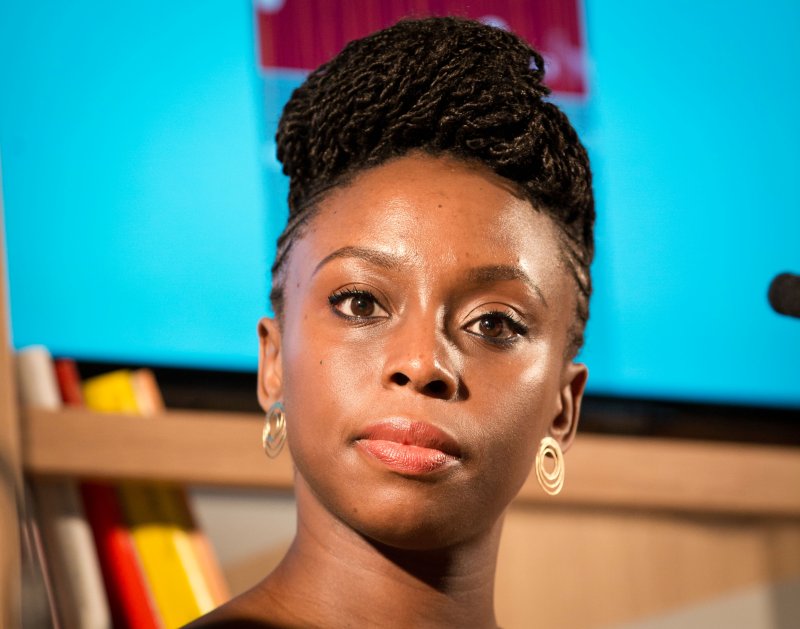
The multi-award-winning Nigerian novelist Chimamanda Ngozi Adichie has been coaching and mentoring African writers through her annual creative writing workshop. The program holds in Lagos and Awka in Nigeria and has more than 200 graduates, including rising stars like Ayobami Adebayo, whose debut novel “Stay With Me” was shortlisted for the Baileys Prize, and Jowhor Ile, the first Nigerian winner of the Etisalat Prize for Literature.
The workshops, with just 20 students out of thousands of applicants, are intimate and for some graduates, career-defining, leading to book deals, prizes and residencies.
According to Chimamanda, “We become, even if only briefly, a family,” That was how he described the impacts of the program
However,at the moment, there is a rift between Adichie and one of her most prominent students, the writer Akwaeke Emezi, which has spilled into public.
Adichie accused a former student of publicly attacking her after a 2017 interview in which Adichie said, among other things, “I don’t think it’s a good thing to talk about women’s issues being exactly the same as the issues of trans women.”
In that long essay that she published on her website, Adichie held up the personal feud as a cautionary tale about how social media has been used by “certain young people” as an ideological battering ram rather than a place to communicate and seek understanding.
She continued,“There are many social-media-savvy people who are choking on sanctimony and lacking in compassion, who can fluidly pontificate on Twitter about kindness but are unable to actually show kindness,” she wrote. “People whose social media lives are case studies in emotional aridity. People for whom friendship, and its expectations of loyalty and compassion and support, no longer matter. People who claim to love literature — the messy stories of our humanity — but are also monomaniacally obsessed with whatever is the prevailing ideological orthodoxy.”
In that very long essay, Adichie did not mention any names of the people she was writing about. She, however, published emails sent by those people and used them to authenticate what she was writing about. There was a certain kind of suspense as many of the people who read the essay wanted to know who these individuals were.
Shortly after Adichie posted her essay, social media erupted. Her name was a trending topic on Twitter for hours, prompting tens of thousands of responses. Some people dissected and criticized her views on gender, while others agreed that some people use social media as a weapon.
And While many of her readers, especially across the various social media platforms were still asking for the identities of the persons, one of the students in the center of the controversy, another writer called Emezi soon responded on Instagram, saying that Adichie had published emails without seeking permission and that the essay was designed to “incite hordes of transphobic nigerians to target me.” In a later post, Emezi, who uses they/them pronouns and identifies as nonbinary, criticized the publishing industry for championing Adichie, the author of the novels “Americanah” and “Half of a Yellow Sun.”
“Adichie’s social capital originated from the publishing industry,” wrote Emezi, whose memoir, “Dear Senthuran,” was published last week. “You in the industry continue to platform her, laud her work with no mention of the harm her views inflict on the trans community, and on other writers.”
Through a publicist, Adichie declined to comment. Emezi did not respond to a request for comment.
The Nigerian writer, whose works include Half of a Yellow Sun and Americanah, said it was important people realized human nature made them inherently “flawed”.
Appearing on BBC Two’s Inside Culture, Adichie told host Dame Mary Beard that this “flawedness” was integral to her work, which has been celebrated by Oprah Winfrey and Michelle Obama.
Chimamanda Ngozi Adichie in conversation with Michelle Obama (Yui Mok/PA)
She said: “Social media has given rise to a very shallow, hollow outrage culture.
“I think we need to recognise we’re flawed, we really are, and I think in some ways it’s the essence of literature and storytelling – that ‘flawedness’ of human nature.”
Adichie, 43, called for people to show more compassion and loyalty on social media.
She added: “I feel as though right now with social media, there’s a kind of performance that is really what is important.
“So somebody says something that’s somehow outside of the accepted orthodoxy, and suddenly that person’s friends are all being asked to denounce that person, and I’m thinking: whatever happened to basic old-fashioned ideas of ‘you’re my friend and I’m going to stand by you’?
“You know, loyalty – I’m going to have a bit of compassion for you. I’m going to think you were maybe just having a bad day – you know, one is allowed to have a bad day.”
Adichie said social media had created a “hardness in the culture” about how people talk about political and social subjects.
She added: “It worries me because I find it to be lacking in compassion and also I find it quite uninteresting.”











